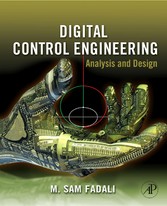Suchen und Finden
Digital Control Engineering - Analysis and Design
Digital Control Engineering covers the fundamental principles and applications of digital control engineering, with emphasis on engineering design.
Digital controllers are part of nearly all modern personal, industrial, and transportation systems. Every senior or graduate student of electrical, chemical or mechanical engineering should therefore be familiar with the basic theory of digital controllers. This book features Matlab sections at end of each chapter which show how to implement concepts from the chapter. Mathematics is used to help explain concepts, but throughout the text discussion is tied to design and implementation. It contains review material to aid understanding of digital control analysis and design.
Examples include discussions of discrete-time systems in time domain and frequency domain (reviewed from linear systems course), and root locus design in s-domain and z-domain (reviewed from feedback control course). In addition to the basic topics required for a one semester senior/graduate class, the text includes some advanced material to make it suitable for an introductory graduate level class or for two quarters at the senior/graduate level.
Examples of optional topics are state-space methods, which may receive brief coverage in a one semester course, and nonlinear discrete-time systems.
Extensive Use of computational tools: Matlab sections at end of each chapter show how to implement concepts from the chapter.
Frees the student from the drudgery of mundane calculations and allows him to consider more subtle aspects of control system analysis and design.
An engineering approach to digital controls: emphasis throughout the book is on design of control systems. Mathematics is used to help explain concepts, but throughout the text discussion is tied to design and implementation. For example coverage of analog controls in chapter 5 is not simply a review, but is used to show how analog control systems map to digital control systems.
Review of Background Material: contains review material to aid understanding of digital control analysis and design. Examples include discussion of discrete-time systems in time domain and frequency domain (reviewed from linear systems course) and root locus design in s-domain and z-domain (reviewed from feedback control course).
Inclusion of Advanced Topics
In addition to the basic topics required for a one semester senior/graduate class, the text includes some advanced material to make it suitable for an introductory graduate level class or for two quarters at the senior/graduate level. Examples of optional topics are state-space methods, which may receive brief coverage in a one semester course, and nonlinear discrete-time systems.
Minimal Mathematics Prerequisites
The mathematics background required for understanding most of the book is based on what can be reasonably expected from the average electrical, chemical or mechanical engineering senior. This background includes three semesters of calculus, differential equations and basic linear algebra. Some texts on digital control require more mathematical maturity and are therefore beyond the reach of the typical senior.
Professor and Chair of Department of Electrical & Biomedical Engineering, College of Engineering, University of Nevada, Reno, NV, USA.
M. Sami Fadali earned a BS in Electrical Engineering from Cairo University in 1974, an MS from the Control Systems Center, UMIST, England, in 1977 and a Ph. D. from the University of Wyoming in 1980. He was an Assistant Professor of Electrical Engineering at the University of King Abdul Aziz in Jeddah , Saudi Arabia 1981-1983. From 1983-85, he was a Post Doctoral Fellow at Colorado State University. In 1985, he joined the Electrical Engineering Dept. at the University of Nevada, Reno, where he is currently Professor of Electrical Engineering. In 1994 he was a visiting professor at Oakland University and GM Research and Development Labs. He spent the summer of 2000 as a Senior Engineer at TRW, San Bernardino. His research interests are in the areas of fuzzy logic stability and control, state estimation and fault detection, and applications to power systems, renewable energy, and physiological systems
Alle Preise verstehen sich inklusive der gesetzlichen MwSt.






